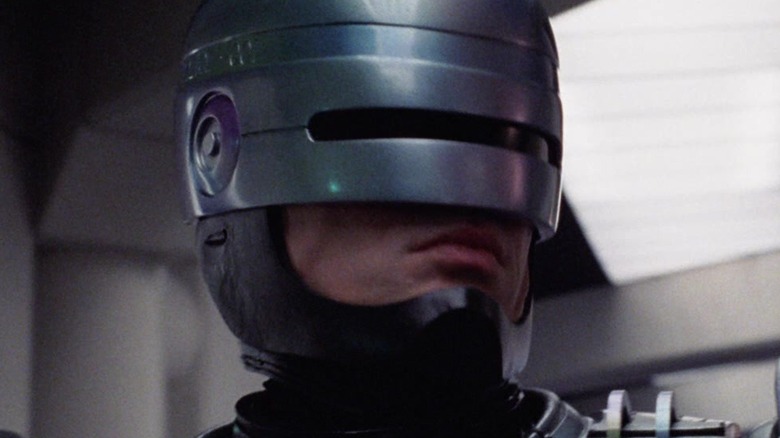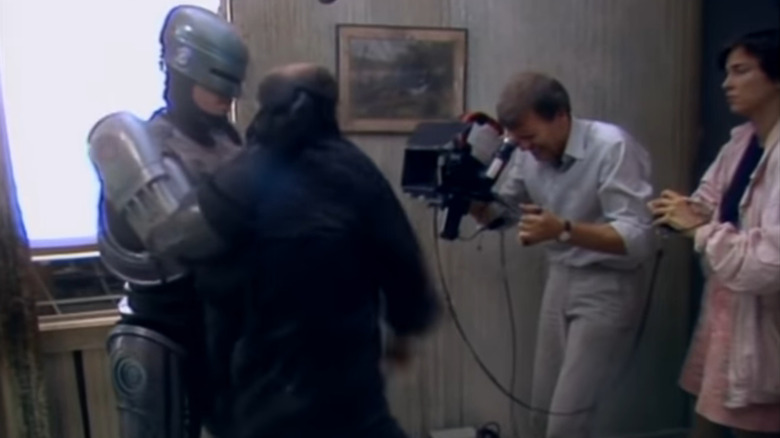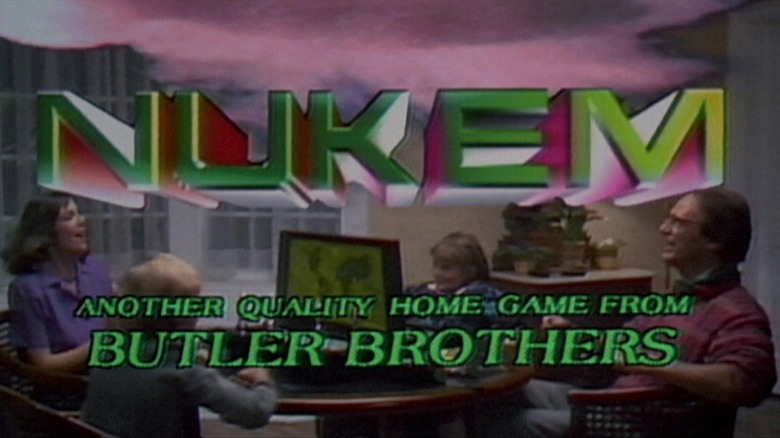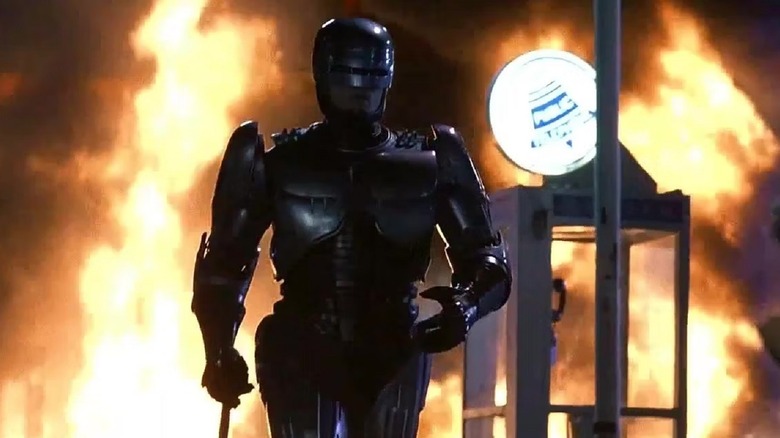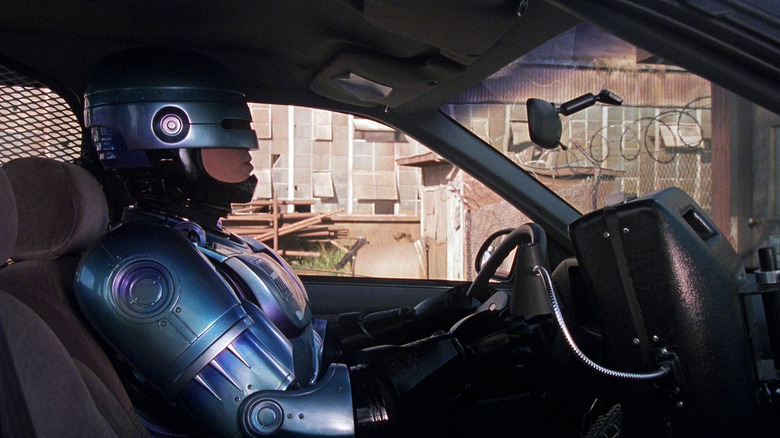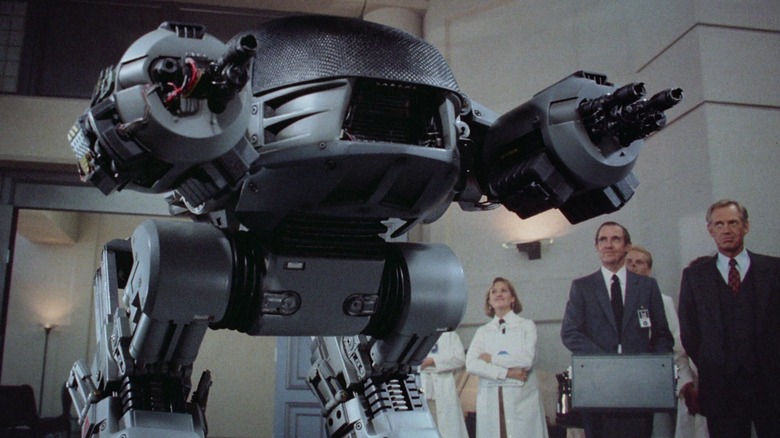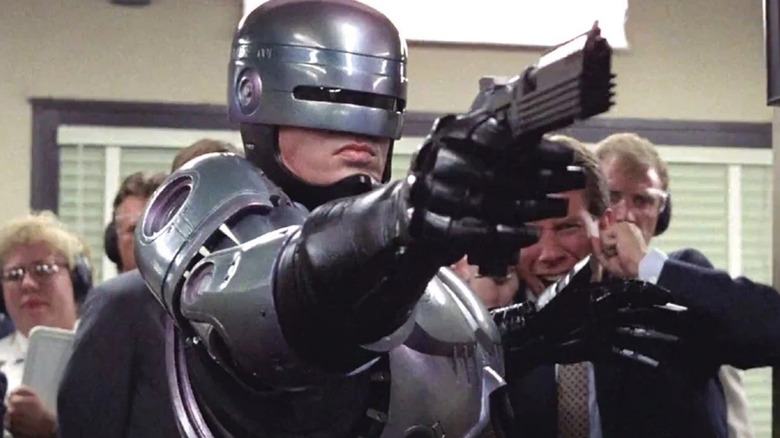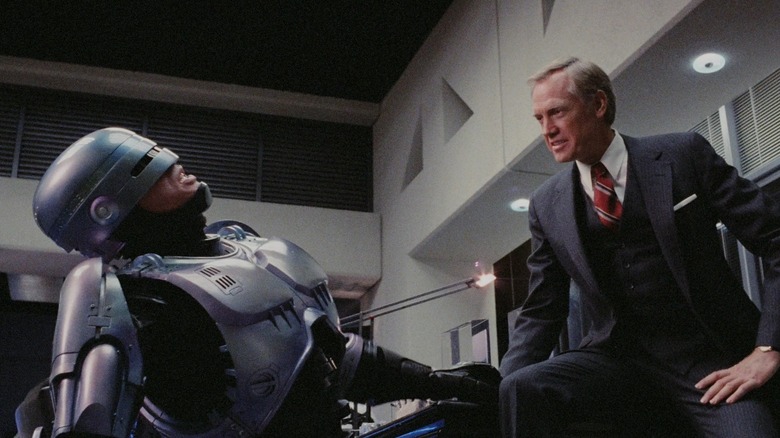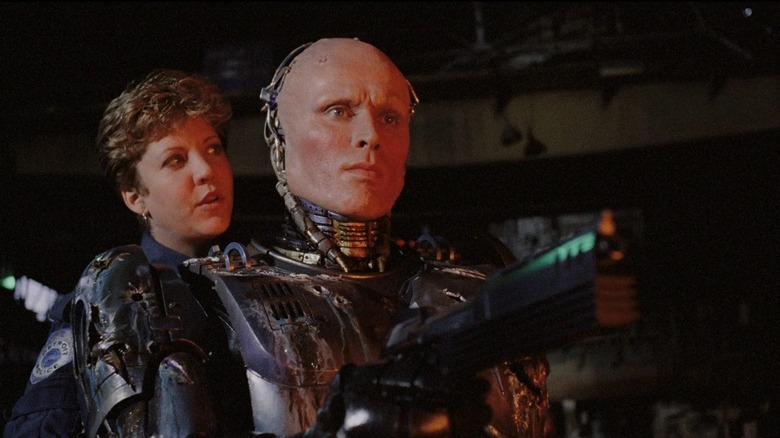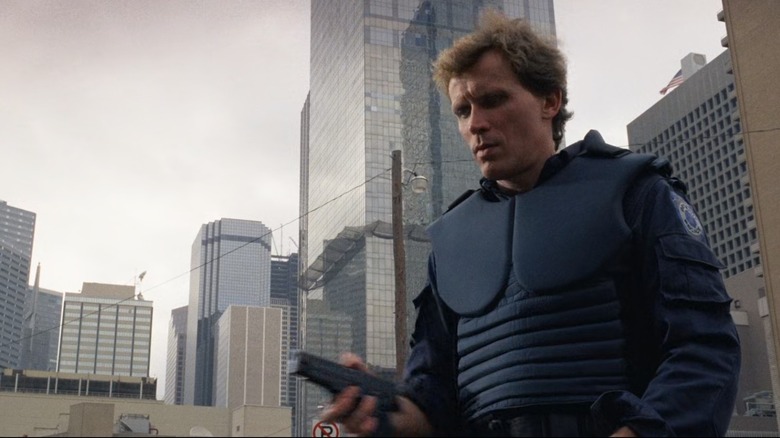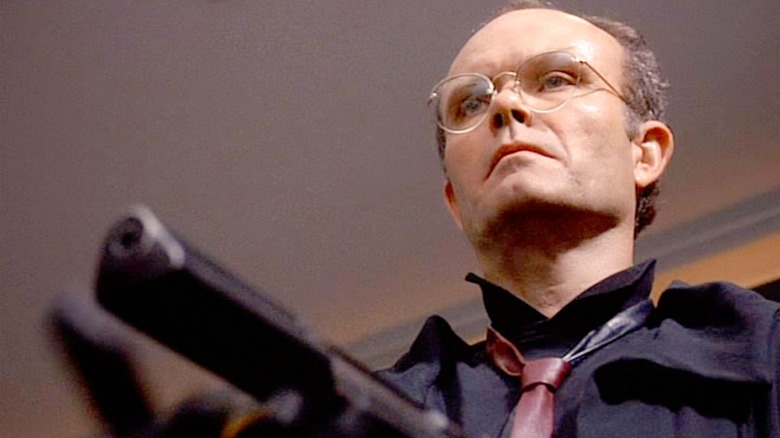The Best And Worst Things In RoboCop
The concept may sound simple: half-man, half-robot, cleaning the streets of crime and fighting against the evil corporation that made him. That's RoboCop in a nutshell. However, many overlook this metal hero story as just another action flick with a cool-looking protagonist. In truth, "RoboCop" remains an iconic, often unabashedly gory, sci-fi movie, consisting of layered characters, social commentary, and dark humor, mixed up in a believable dystopian future and carnage on the streets. "RoboCop" stands out among its sci-fi brethren, proudly bearing its own oddball tone, a new kind of hero, and real heart — even if it's one made of chrome-plated steel.
Indeed, director Paul Verhoeven, along with writers Edward Neumeier and Michael Miner, created something special, but it wasn't easy. For a film that almost didn't make it out of production (per Hollywood Outbreak), this 1987 classic is remembered fondly and has (mostly) withstood the test of time. Today, the character can be seen as a downloadable fighter for "Mortal Kombat 11" or skin in "Fortnite," and 'ol Robo even has a new movie in the works. It's hard to say if anything in the extended franchise will ever be able to match up to the original, from the live-action and animated shows, video games, sequels, and reboots, but as the original celebrates 35 years, we want to focus on the good and bad of RoboCop's first and greatest adventure.
Worst: Production issues
One of the standout lines of Netflix's "The Movies That Made Us" episode on "RoboCop" is, "Everyone had a horrible time on 'RoboCop.'" That's everything you need to know about the movie's production. It's usually a challenge to gather the right people for a project remembered as fondly as this, but many didn't want to approach "RoboCop" initially, simply because of the silly title. Director Paul Verhoeven thought the script was too cheesy and would've passed on the film, but his wife, Martine Tours, told him to read it again and look past the basic action set-up (per Deep Focus Review). Once the team was assembled, however, the problems really started.
Building RoboCop's iconic suit was a long and difficult process. To save time and money, the shooting schedule was reworked while they waited. When the costume was finished, it took actor Peter Weller 12 hours to get into (per Hollywood Outbreak), the legs wouldn't fit into the squad car, and the heat required an AC unit to be installed.
Most of the film was shot in Dallas, Texas, which the production was kicked out of after the effects crew, tired of Verhoeven asking for bigger explosions, went a little too hard when blowing up the gas station. Some simple shots also took an entire day to film, like RoboCop catching the car keys (per The Wrap). And after production wrapped, "RoboCop" wasn't done — the movie was originally X-rated and needed major adjustments to be releasable.
Best: Cold-steel satire
"RoboCop" is generic and silly '80s fanfare — on the outside, at least — but there's definitely more to it than what's on the surface. The premise of "RoboCop" is about arming the police with bigger and better weapons — one of which just happens to be the main character. It shows an impoverished future, touches on gentrification, makes fun of how much nonsensical media the masses consume, and uses Omni Consumer Products (OCP) as a villain to point out issues with politics, influence, and cold-hard capitalism, and that's all before the classic themes of revenge and man versus machine.
This is a movie that stands above its peers because it also pokes fun at the action genre in general (per Film School Rejects). It sees the violence of other films and ups the ante, to the point of intentional excess, drowning the audience in carnage. What it says about society is harsh, heartless almost, much like the main character, who is struggling to find himself. As with a lot of other good science-fiction, these themes in "RoboCop" border on parody. They aren't subtle but also don't need to beat the viewer over the head when the message is in every scene, particularly those ridiculous commercials, especially with how they were edited in. "RoboCop" does what great satire has always done: reflects society back onto itself.
Worst: Collateral damage
RoboCop isn't great at being a cyborg (those pesky human memories) and even worse at being a police officer. He makes exactly one successful arrest in the entire film, an action that amounts to absolutely nothing when the suspect is released from custody hours later and strolls into his boss' office wearing a new suit, gloating about getting out of jail. He's also the only character Robo attempts to read his rights, but he does this while exploring the limits of police brutality. This robot cop also can't be cost-effective for the force, as his charging station and monitoring computers take up a chunk of the police station and have to be jacking up their power bill.
It's an action movie, so there is an expected body count, but scenes like the raid on the drug lab show how anyone can wind up dead if Alex Murphy has a personal vendetta toward them. There are several criminals who could have simply been restrained or incapacitated but eat a bullet instead because "excessive force" is practically Murphy's middle name. He destroys property several times trying to stop people who shouldn't pose much of a problem, but the gas station is a perfect example of how RoboCop is programmed to punish criminals, not protect property. Robo's also horrible at dealing with people he helps, monotone and uncaring, as shown with the woman he saves from sexual assault. There's no soft touch with RoboCop, just body bags, destruction, and paperwork.
Best: The music
The original trailers for "RoboCop" used the "Terminator" theme as a placeholder to help boost interest, but this cyborg's theme would definitely learn to walk on its own. It's a score that may not be as instantly recognizable as some other classic '80s movie tunes, while still managing to linger for the audience. Composer Basil Poledouris could have simply leaned into more metallic sounds or heavy drums to focus on the basic premise, but he instead offered the hero a layered theme with triumphant sounds that didn't simply announce his arrival but built up to his ascension as a character.
The theme isn't there right away, instead waiting for the proper moment to unveil itself and running parallel with Alex Murphy's journey (per Movie Music UK). The score complements the action while making us think of the man and machine. The full soundtrack mixes classical sounds of the Sinfonia of London orchestra with synth, where every inclusion has intention, helping to elevate the battle of mind versus programming raging inside RoboCop. For something different, however, there is the track "Show Me Your Spine," featured in the club scene with Leon (Ray Wise). This wasn't on the original soundtrack but was later released on a Ministry album, as the group that performed it, PTP, featured members of that band and Skinny Puppy.
Worst: Aging effects
Not only did RoboCop require a lot of stunt performers, gunfire, and explosions, but there was also the matter of presenting the futuristic city, one violent mutation to splatter, and two large robots. Though many of these visual spectacles and performances look great and have managed to hold up years later, not all of them have fared so well.
Many of the discrepancies fans have come down to the film being transferred to new formats and shown at a higher quality. This makes it easier to see how a few of the stunts were done, like the pane of glass breaking before the bad guy was thrown through it, or the way that many of the gorgeous matte paintings stand out, breaking the immersion, or how the blue and grey filters make parts look more dated.
Another big (literally) issue was ED-209, RoboCop's mechanical nemesis. A full-sized model was built but couldn't be used for the action shots, so the legendary Phil Tippett of "Star Wars" fame designed a smaller Enforcement Droid and brought it to life in stop-motion (per Uproxx). Even though ED-209 isn't moving on screen a lot, many believe the work done here could have been better, even if it is just another victim of updated televisions. The visual effect is less noticeable when the robot is screeching horribly.
Best: Bloody violence
Violence and mayhem are staples of '80s action cinema, but Paul Verhoeven had a point to make, and it was going to require more than the normal amount of blood and gore. Whether someone watches "RoboCop" for the commentary and shows of excess or just because it's a good action flick, there is plenty of murder and brutality to go around. Some of these scenes, like Alex Murphy's execution and ED-209 blasting away at the OCP junior executive (Kevin Page), were intentionally designed to try and make the audience feel sickened. For some viewers though, that same level of grotesque savagery has been described in a positive way as "pornographic" (via IndieWire).
"RoboCop" initially received an X-rating because of its ruthlessness, meaning a couple of key scenes had to be trimmed down, but not by too much, thankfully. Even with so many gunshot-related deaths, there are plenty of more horrific deaths. Bob Morton's (Miguel Ferrer) assassination via grenade is another scene that most viewers recall, as well as Emil (Paul McCrane) not only being mutated by toxic sludge, but messily splattered against a fancy new car, or the iconic body toss of, "Can you fly, Bobby?" This level of violent behavior is ingrained into the world of "RoboCop" — no one is meant to die well. The big deaths at the end are all spectacles, and the survivors look horrible. It's memorable, though, and satirical and knowing in its over-the-top violence, and that's the point.
Worst: Actor complications
This film features Peter Weller as Alex Murphy and, more importantly, RoboCop. Sure, he's mostly just lips and a strong chin, but those were important features when casting. Weller wasn't the first name considered for the role, and he almost wasn't the last. The actor and Paul Verhoeven weren't getting along, and he was temporarily fired from the production with the threat of recasting, but thankfully, the two were able to come to an understanding so the film could be finished (per IndieWire). However, with what the movie had already been through, the last thing the production needed was trouble with its main star.
Weller takes his craft seriously and wanted to make sure that he moved properly as a cyborg, which involved having a special instructor helping him with mime movements for what seemed like the simplest actions (per Hollywood Outbreak). This wasn't what anyone else on the crew had envisioned, however, and none of it mattered after the hours it took to get him into the suit, as they realized its bulkiness prevented him from performing the maneuvers either way. Weller also didn't want to say the lines as written, asking to make up his own fancy prime directives, co-writer Edward Neumeier told Money Into Light, but that was shot down. He also insisted the cast and crew refer to him only as Murphy or Robo, even when not filming, which had some of his colleagues outright refusing to speak to him, Miguel Ferrer said.
Best: No robot love
RoboCop isn't the only hero in this story, as audiences were also introduced to his partner, Anne Lewis (Nancy Allen). Most movies of the time would have had some romance arc between the two cops or at least given Alex Murphy more of an on-screen love interest than what we see of his wife (Angie Bolling), but there is, thankfully, no robotic love story here. Paul Verhoeven tried to add an affair between Murphy and Lewis into the film for a bit more European grit, he told The Guardian, but it's probably better that didn't work.
There are sexual elements in the movie, from Bob Morton's lady friends to the co-ed police locker room scene, and some probably found RoboCop himself sleek and sexy with all that chrome and black armor. Whatever attractions there are in the film, there's nothing more between Murphy and Lewis — the movie was trying to break down some gender restrictiveness and show them as equals. When Murphy becomes RoboCop, this is demonstrated even more, by exploring the memories of his family, the more meaningful connections, when the film becomes about the man trapped inside and shows that his only desires are revenge and justice. Trying to force a relationship between a normal human and a cyborg would have fit with some of the cheesiness of the era, but not having it has undoubtedly helped "RoboCop" stand the test of time more.
Worst: Murphy is boring
Alex Murphy isn't a traditional hero — he's an everyman action star, like John McClane (Bruce Willis) in "Die Hard." Peter Weller was brought on because of his physique and ability to give the robot some depth and heart, but he's also a bit boring. The most interesting thing about Murphy — and the best part of Weller's performance — is his death, and that wouldn't have happened had his partner not been distracted watching one of the criminals urinate.
The only other memorable thing our main character does as a human is twirl his gun, since that comes back later. He connects this action to his son, building their relationship, but even in that, he's practicing to be more like the hero his kid admires and not the civil servant father. Murphy becomes that figure in many ways but has to lose almost all of his limited personality to do it.
Once RoboCop is born, he becomes even more of a tool, just for exterminating lowlifes. There's an attempt to inject more human qualities and traits into him, but in most scenes, he's now simply a machine with the lingering ghost of Murphy's memories, a watered-down version of an already dull man. This is combined with Paul Verhoeven using Robo as a Christ-like figure, from his bullet-crucifixion to a shot that shows him walking on water toward the end (per Deep Focus Review). The criminals, however, keep the story interesting and moving until every last one is smitten.
Best: Clarence Boddicker
Every half-decent action movie protagonist needs a good foil. "RoboCop" has several charismatic and interesting villains, in the boardroom and the streets, but none of them are as cold, clever, or ruthless as Clarence Boddicker (Kurtwood Smith). Just like Robo himself, Boddicker wasn't a typical antagonist for the time. Even avoiding the "That 70s Show" references, Smith looks more like an angry father than a crime lord, but his actions speak loudly. From the beginning of the movie, we learn that he's in charge, a cop-killer, and soon after we watch as he sacrifices one of his own men to ensure his escape, complete with a cutthroat line to make sure his minion dies scared.
Even with his small frame and glasses — supposedly going for a Nazi doctor look, Paul Verhoeven told The AV Club — Boddicker makes a big impression with some even bigger guns and grenades. The man is a serious threat, and he has an attitude, spitting blood on the police paperwork when he's arrested, which was apparently Smith's idea. He's overly confident up until his death, as demonstrated in his negotiation with Sal (Lee de Broux). Boddicker's verbal and physical abuse of others isn't a shield or defense mechanism, but rather a privilege the criminal feels he's owed. At no point does the character ever fear RoboCop or feel like he can't beat him; even in the showdown at the bitter end, Boddicker thinks he's finally won and goes out like the badass he always carried himself as.
